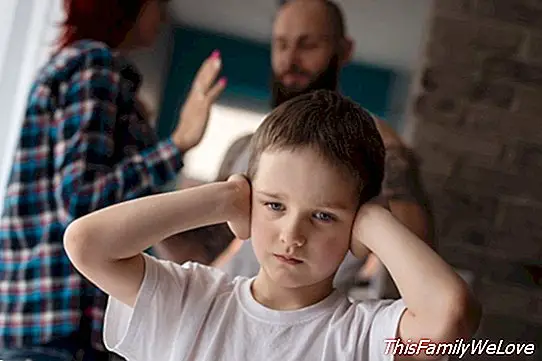The bad relationship between parents ends up affecting the grades of their children

Although the family is composed of several members, it acts as a single entity. What happens to one of its members ends up affecting the rest of the people. If there is tension between some components of the house, the climate inside the home will cloud to the point where everyone is affected by this behavior. An example is the study conducted by the Spanish Journal of Sociological Research.
An investigation that puts on the table the consequences that has on the smallest the conflicts between the parents. Those children who see their parents argue in their presence and show conflicting attitudes among them, present worse grades than the rest.
Less chance of passing
This study was based on the analysis of the perceptions transmitted by 2,371 teenagers between 13 and 16 years old, age they had at the time their answers were collected. The data revealed that it is not the conflict itself that gives rise to bad grades and the worst outcome in children, but rather the way in which these disputes are handled by parents.
Those children of parents who do not bet on a dialogue among them when solving a conflict, they presented a greater probability of suspending than the rest of the comrades who also participated in this survey. Specifically, these adolescents had a total of 2.1 more chances of academic failure compared to other students with more dialoguing parents.
Influence in the dream
This study is not the first one that focuses on how the bad relationship between parents affects their children. Other research carried out by the University of Oregon It provides a new reason for couples to learn to solve their conflicts and prevent them from reaching their children: to ensure a good rest in their babies. As these data show, families with a more deteriorated climate make the younger ones rest worse, something that ends up affecting their rest
Those responsible for this study point out the importance of a calm climate so that the baby can feel safe before falling asleep. To verify this hypothesis, he gathered 357 families with a baby between 9 and 18 months. In this case, the child was adopted to avoid possible genetic connections that caused this alteration in the rhythm of sleep.
All parents participating in this study participated in an interview when their babies were nine months old. With these polls It was intended to assess the marital instability that each couple went through at some point, for which questions about their relationship were raised, including whether any of the parties had considered the separation.
At the same time, parents independently answered another questionnaire where they should talk about their children's ability to fall asleep and stay that way throughout the night. The team conducted several interviews tracing when each child when they turned one year, and one year and a half. In these cases the parents had to answer the same questions as in their first meeting about the quality of their marriage and about the children's sleeping patterns.
"We discovered that marital instability when babies are nine months old are able to predict sleep problems at 18 months (...) That is to say: a child's sleep difficulties do not predict or imply a lack of marital harmony of the parents ", explains Anne M. Mannering, the main author of this research.
Damián Montero




